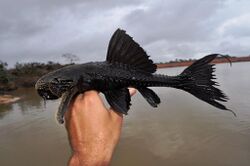Biology:Acanthicus hystrix
| Acanthicus hystrix | |
|---|---|

| |
| From the Xingu River (Altamira, Pará, Brazil) | |
| Scientific classification | |
| Domain: | Eukaryota |
| Kingdom: | Animalia |
| Phylum: | Chordata |
| Class: | Actinopterygii |
| Order: | Siluriformes |
| Family: | Loricariidae |
| Genus: | Acanthicus |
| Species: | A. hystrix
|
| Binomial name | |
| Acanthicus hystrix | |
| Synonyms | |
| |
Acanthicus hystrix, the lyre-tail pleco,[2] is a species of armored catfish native to the Amazon, Tocantins–Araguaia and Orinoco basins.[1] It is typically found at various depths on a rock or rock–gravel bottom in the main channel of rivers in places with moderate to strong current,[1] although it also occurs in slow currents.[2] The species is occasionally seen in the aquarium trade, but its adult size and territorially aggressive behavior means that a very large tank is required.[2]
Appearance
It grows to 62.8 cm (2.06 ft) in standard length,[1] but may possibly reach 100 cm (3.3 ft).[2] Its color ranges from medium-brown to near-black (especially those from the Madeira, Branco and Xingu rivers are dark), and the underparts often have a vermiculated pattern.[1] Some of the variants are commonly considered as separate, undescribed species in the aquarium trade (e.g., L193 from the Orinoco basin and L407 from the Branco basin; in the L-number system), but there is extensive overlap in the morphometrics of the different populations.[1] Unlike the polka dot lyre-tail pleco (A. adonis), A. hystrix never has white spots.[1] Adult males are especially spiny with extensive odontodes on the cheeks and opercle.[1]
References
- ↑ 1.0 1.1 1.2 1.3 1.4 1.5 1.6 1.7 Chamon, C.C. (2016): Redescription of Acanthicus hystrix Agassiz, 1829 (Siluriformes: Loricariidae), with comments on the systematics and distribution of the genus. Zootaxa, 4088 (3): 395–408.
- ↑ 2.0 2.1 2.2 2.3 "Acanthicus hystrix". SeriouslyFish. http://www.seriouslyfish.com/species/acanthicus-hystrix/. Retrieved 31 October 2017.
Wikidata ☰ Q3752833 entry
 |

